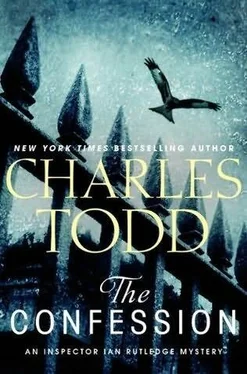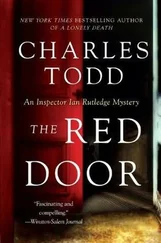Charles Todd - The Confession
Здесь есть возможность читать онлайн «Charles Todd - The Confession» весь текст электронной книги совершенно бесплатно (целиком полную версию без сокращений). В некоторых случаях можно слушать аудио, скачать через торрент в формате fb2 и присутствует краткое содержание. Жанр: Полицейский детектив, на английском языке. Описание произведения, (предисловие) а так же отзывы посетителей доступны на портале библиотеки ЛибКат.
- Название:The Confession
- Автор:
- Жанр:
- Год:неизвестен
- ISBN:нет данных
- Рейтинг книги:5 / 5. Голосов: 1
-
Избранное:Добавить в избранное
- Отзывы:
-
Ваша оценка:
- 100
- 1
- 2
- 3
- 4
- 5
The Confession: краткое содержание, описание и аннотация
Предлагаем к чтению аннотацию, описание, краткое содержание или предисловие (зависит от того, что написал сам автор книги «The Confession»). Если вы не нашли необходимую информацию о книге — напишите в комментариях, мы постараемся отыскать её.
The Confession — читать онлайн бесплатно полную книгу (весь текст) целиком
Ниже представлен текст книги, разбитый по страницам. Система сохранения места последней прочитанной страницы, позволяет с удобством читать онлайн бесплатно книгу «The Confession», без необходимости каждый раз заново искать на чём Вы остановились. Поставьте закладку, и сможете в любой момент перейти на страницу, на которой закончили чтение.
Интервал:
Закладка:
It was set well back from the main road and difficult to see in the dying light. Contrary to what the woman in the tea shop had told him, it was most likely the same size as River’s Edge, possibly even a little smaller.
But in a far better state of repair. The gardens were immaculate, and the fountain in front of the door was splashing audibly in the quiet of the evening. Even the mortar between the bricks was smoothly dressed, without cracks or crevices. There were gas lamps lit by the door, their flames flickering gently. He lifted the brass knocker and let it fall against the plate behind it.
After several minutes a maid answered the door, her uniform crisp and her manner formal.
He identified himself and asked for Mr. Laughton.
“I’ll see if he is receiving visitors, sir.”
She left him in the spacious hall and returned finally to invite him to step into the library.
He found Mr. Laughton there, a man of perhaps fifty, in evening dress, his right sleeve empty and pinned at the shoulder. He was standing with his back to the open windows at the far end of a richly appointed room, the gilt and leather bindings on the shelves catching the lamplight while comfortable chairs were arranged by the cold hearth.
“Mr. Rutledge,” he said in greeting.
“Good evening, sir. I regret the intrusion, but I’m investigating a crime in London. Information has led me here, where I believe you have employed a footman by the name of Benjamin Willet.”
“Good God,” Laughton said blankly. “Willet? He was employed here before the war. A good man, as I remember. Very conscientious. Like everyone else, he enlisted as soon as he could-giving us a month’s notice, mind you. Typical of him.”
“And did he come home from the war?”
Laughton took a deep breath. “No. He didn’t. That’s to say he survived the war, and his place was waiting for him, as we’d told him it would be. But two months after the Armistice, he wrote to us from London to say that he had discovered a new vocation.”
“What was it?”
“He didn’t say, but his letter was enthusiastic, as if whatever it was strongly appealed to him. And he asked if we would mind keeping the boxes-those he left with us when he went into the Army-until he could send for them. Now that I think about it, I don’t believe he ever did.”
“And you’ve had no further correspondence from him?”
“To my knowledge, no. But he might well have written to someone on the staff.”
“Would it be possible to speak to them? And to look at the belongings he left here?”
“Tonight?”
“I’m afraid so. It’s a pressing inquiry,” Rutledge added.
“Well. Let me see if Thompson can help you find them.”
He crossed the room to ring the bell by the hearth, saying, “In the war, were you?”
It was a common question, a way of judging a man that hadn’t existed before 1914, when position and money determined who or what he was. War, thought Rutledge with irony, was a great leveler.
“Yes, sir. I commanded Scots troops on the Somme. And elsewhere.”
“Did you, by God! Bloody work, that.” He touched his sleeve. “Left my hand there, and they took my arm in hospital. Ended my war straightaway, I can tell you. But they kept me busy at the War Office for another year. Replacing younger men, freeing them for service.” He sighed heavily. “And they all died, you know. Every damned one of them. I felt somehow responsible. Ah. Here’s Thompson. Inspector Rutledge is looking into a crime in London. Do you think you could lay hands to those boxes Willet left behind? I don’t think anything was ever done with them.”
The butler was late middle-aged, his hair graying. “They are still there, sir. We didn’t feel it was right to get rid of them. We’d hoped young Willet would come for them one day. Of course the war has been over for two years. Still and all, we thought it best.”
“Yes, quite right, Thompson. Can you see to it? And the Inspector would like to speak to the staff as well. Those who remember young Willet.”
“Indeed, sir. If you’ll come this way, Inspector?”
Rutledge thanked Laughton and was about to follow Thompson to the door when he was stopped.
“I say, you don’t believe Willet is in any way involved in this business, whatever it may be?”
To tell the truth would forewarn Thompson and the staff.
Rutledge fell back on standard police formula. “At this stage of the inquiry, I’m not at liberty to say more. I will tell you that there is no danger of Benjamin Willet being taken into custody at any time.”
Laughton accepted that at face value.
“Good. Good. I’d hate to think he’d been in any sort of trouble. Good night, then. I wish you luck.”
Thompson shut the door and ushered Rutledge to another under the main stairs, where a short flight led down into the kitchen and the servants’ hall.
“We’ll begin with the staff, if you don’t mind, sir. They happen to be available at the moment.”
Rutledge could now see that the servants were just clearing away the dinner served in the family dining room upstairs and preparing to eat their own meal.
Thompson explained who this visitor was and why he had come.
Rutledge thanked him, and added, “Did any of you correspond with Willet on a regular basis?”
The woman in the black dress of a housekeeper said, “We all took turns writing to him and to the others who went away. And he’d answer us. Very interesting letters about France and the war and whatever news he might have. When he came home, he mentioned that he wished to try something new, and if it didn’t work out, he’d like to know he was still welcome here. But that’s the last we’ve heard. Is he all right? What has young Willet got to do with Scotland Yard?”
“I’m not at liberty to say,” he told them once more. “Do you know what it was that he wished to try? And was he expecting to remain in London?”
“I do remember he was staying with a friend,” one of the housemaids answered shyly. “I thought perhaps it was someone he’d met in the Army.”
“It was nice stationery,” the cook added. “We commented on that. Very thick, very expensive.”
“A house in Chelsea,” the other housemaid added. “He said there was no room in the house in Chelsea for his boxes, and would Mr. Thompson here keep them safe until he could send for them. I thought perhaps he might have been taken on as a valet by one of the officers he’d served under.”
Beyond that, they had no more information to offer him.
Thompson thanked them for their cooperation and conducted Rutledge to the servants’ stairs. He followed the butler up several flights to the floor where the staff slept. Halfway down the passage a separate staircase led up to a closed door.
Thompson took out a ring of keys and unlocked it.
There were electric lights in the attic, illuminating the rafters and the detritus of generations who had shared the same house. Trunks and boxes, cast-off furniture, outgrown toys cluttered the floor. Two long shelves on either side of the attic housed a collection of oil lamps, candlesticks, and an array of hat boxes.
Thompson led him down the room to an open space under the eaves where several boxes had been stored, well bound with heavy string and marked with the name WILLET in large letters.
“There you are, sir. I thought they might still be here. I doubt anyone has touched them since young Willet left.”
“I’d like to open them,” Rutledge said. “Can we drag them out into the middle of the floor?”
“Yes, sir. But you will be careful, will you not, Inspector? He may still wish to claim them.”
Willet would never claim them. Still, Rutledge respected the butler’s concern.
Читать дальшеИнтервал:
Закладка:
Похожие книги на «The Confession»
Представляем Вашему вниманию похожие книги на «The Confession» списком для выбора. Мы отобрали схожую по названию и смыслу литературу в надежде предоставить читателям больше вариантов отыскать новые, интересные, ещё непрочитанные произведения.
Обсуждение, отзывы о книге «The Confession» и просто собственные мнения читателей. Оставьте ваши комментарии, напишите, что Вы думаете о произведении, его смысле или главных героях. Укажите что конкретно понравилось, а что нет, и почему Вы так считаете.












